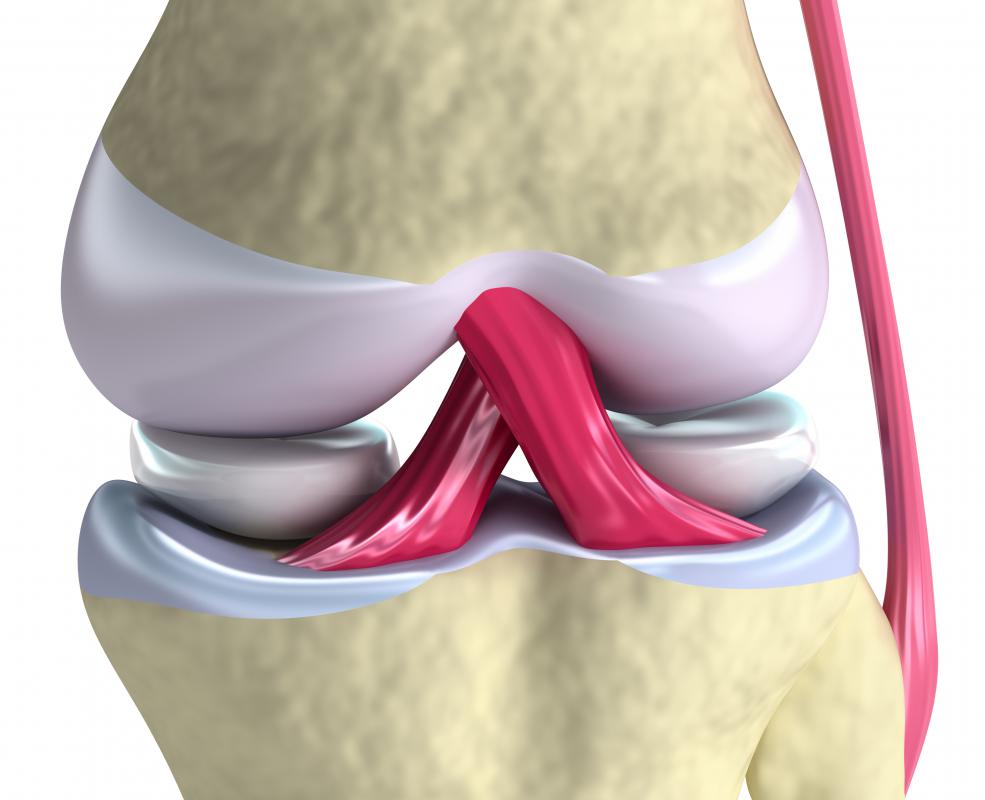At TheHealthBoard, we're committed to delivering accurate, trustworthy information. Our expert-authored content is rigorously fact-checked and sourced from credible authorities. Discover how we uphold the highest standards in providing you with reliable knowledge.
What Causes Knee Swelling?
Knee swelling is most commonly caused by blood or fluid either inside or around the knee joint. Accumulations of the fluids are usually caused by injury. This is especially true if the swelling in the knee is sudden. Aside from injury, conditions such as arthritis and gout can also lead to knee swelling.
There are four major ligaments associated with the knee joint, and the one that is most prone to injury or tearing is called the anterior cruciate ligament (ACL). ACL tears are often sports related, but can be sustained in many other activities. Most of the time, this ligament is torn when too much pressure is put on the knee when jumping or pivoting. Knee swelling from ACL tears is usually very sudden, and is caused by blood rushing to the inside of the knee. In some cases, ACL tears are so severe that reconstructive surgery is necessary, however, with minor tears, the knee often heals on its own within a couple of months.

In many cases, ligament sprains can also lead to swelling in and around the knee. Sprains are generally not as serious as tears, and do not usually require surgery. Most of the time sprains, though very painful, are completely healed within a few weeks time. Unlike ACL tears, swelling resulting from sprains may take several hours or even days to occur, and the fluid buildup in the knee is usually not bloody.

Arthritis is a condition that can affect one or both knees, and is typically accompanied by pain, stiffness, and swelling. This is because arthritis often causes fluid to build up in and around joints. People who suffer from knee arthritis usually have symptoms that come and go. In many cases, the amount of swelling also seems to correspond to the activity level of the arthritis sufferer. If they have been very active, they may see more swelling.

People who suffer from gout often develop deposits of crystallized uric acid in their knees, and these deposits frequently cause knee swelling. Uric acid is a compound that the body produces to aid in digestion, and is usually eliminated with body waste. People with gout, however, are unable to rid their bodies of the acid; instead, the acid accumulates inside their joints.

Most of the time, knee swelling is treated using non-steroidal anti-inflammatory medications, such as ibuprofen and aspirin. If these medications do not reduce swelling, it may be necessary for the patient to have steroids injected directly into the knee. Most of the time patients are advised to use their knee as little as possible until the swelling has gone down.
AS FEATURED ON:
AS FEATURED ON:















Discussion Comments
@serenesurface-- There are sacs around the knee joint called bursa. These are filled with fluid and sort of act like a cushion around the joint. They absorb shock during activity and reduce irritation or injury to the joint. But if they are used excessively, they can become inflamed. That's what bursitis means. Basically, when the suffix -itis is added to a word, it means inflammation. So bursitis is inflammation of the bursa.
Usually bursitis goes away on its own with rest and cold therapy. But follow your doctor's orders. An anti-inflammatory pain reliever may also be used if the pain is severe but cold therapy and rest is often enough.
What is bursitis exactly? I went to the campus health center with knee swelling and they think it's bursitis. I've not heard of this before. I haven't broken anything which is good. But how long will it take for bursitis to heal?
I thought that gout only affected the toes. I had no idea that it can affect the knees also. My dad has gout in his toes and I know how painful it is for him. He doesn't have it in his knees but I imagine that it's just as painful as gout in toes.
My dad's condition has improved significantly since he has changed his diet and removed foods high in uric acid however. He hasn't had a gout attack in the past six months. He follows his diet perfectly. So I think those with knee gout can experience the same improvement with a diet.
Post your comments